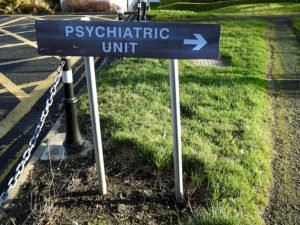
A 72-hour hold under Nevada law – also called an emergency admission, Legal 2000 or L2K – is when a person with mental illness gets placed under medical observation, evaluation, and treatment for three days.
The purpose of a 72-hour hold is to keep these patients safe while the next steps are determined. The hospital can release the patient, or the patient can decide to stay voluntarily, or else the hold can be extended with a district court order.
1. Who can initiate 72-hour holds in Nevada?
The following people can initiate a 72-hour hold for a person suffering from a mental health crisis:
- Law enforcement officers authorized to make an arrest in Nevada (police officers)
- Physicians
- Physician assistants
- Psychologists
- Marriage and family therapists
- Clinical professional counselors
- Social workers
- Registered nurses
Police or medical professionals may – without a warrant – take the patient into custody as long as they have probable cause to believe the patient is suffering from a mental health crisis. And they may transport the patient to a psychiatric hospital for the 72-hour hold or else arrange for transportation.
Note that spouses, parents, adult children, legal guardians, and any other person who has a legitimate interest in the patient can petition the court for an emergency admission to a psychiatric facility. If the court agrees, it will order a peace officer to take the patient into custody for a 72-hour hold. If you need help today, call our Nevada criminal defense lawyers.
2. What is the criteria for a 72-hour hold?
The person must be suffering from a mental health crisis as defined by NRS 433A.0175 & NRS 433A.115. There are two requirements for this crisis intervention:
- The person has a mental illness, and
- The person’s capacity to exercise self-control, judgment and discretion is diminished so that he/she presents a substantial likelihood of serious harm to him/herself or others. This means that the person – without care or treatment – is at serious risk of such dangers as:
-
- attempting suicide or homicide; or
- causing bodily injury to oneself or others, such as death, unconsciousness, extreme physical pain, protracted and obvious disfigurement or a protracted loss or impairment of a body part, organ or mental functioning; or
- incurring a serious injury, illness or death resulting from complete neglect of basic needs for food, clothing, shelter or personal safety
Mental health crisis does not include epilepsy, intellectual disability, dementia, delirium, intoxication, or addiction.
During these 72 hours, mental health professionals will examine and form initial opinions about the patient’s personal needs, health issues, a psychiatric treatment plan, mental health services, and medical care.
(Also see our article about the insanity defense in Nevada criminal cases.)
3. What happens after 72 hours?
There are three options under state law NRS 433A.150:
- The mental health facility releases the patient; or
- The patient voluntarily remains in the facility; or
- The patient continues to be held involuntarily by district court order (called a civil commitment or involuntary admission)
Involuntary admission cannot happen without a district court order. A petition for an involuntary admission can be brought by the patient’s spouse, parent, adult children, legal guardian, any physician, physician assistant, psychologist, social worker, registered nurse, or police.
A hearing must take place within six judicial days of the petition. The patient is entitled to a public defender and may testify. The district attorney will argue in support of involuntary commitment.
The court will order the patient to an involuntary admission if it finds by clear and convincing evidence that the patient is in a mental health crisis. Involuntary admissions expire after 6 months, unless the applicable medical director ends it earlier or the commitment gets renewed.
Civil commitment proceedings are confidential, and court records are sealed. Learn more information about patients’ rights according to the Nevada Disability Advocacy and Law Center.

The timeline for a 72-hour hold. © Nevada Legislature


